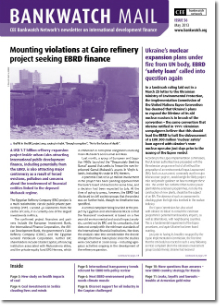Mounting violations at Cairo refinery project seeking EBRD finance

Bankwatch Mail | 10 May 2013
A USD 3.7 billion refinery expansion project inside urban Cairo attracting international public development finance, including potentially from the EBRD, is also attracting major controversy as a result of forced evictions, pollution and concerns about the involvement of financial entities linked to the deposed Mubarak regime.
Mahinour El-Badrawi is Programs Officer at the Research Unit Egyptian Center for Economic and Social Rights
This article is from Issue 56 of our quarterly newsletter Bankwatch Mail
Browse all articles on the right
The Egyptian Refinery Company (ERC) project is a multi-stakeholder, classic public-private partnership (PPP). Located 40 kilometres from the centre of Cairo, it is currently one of the largest investments in Africa.
The confirmed project financiers and partners include the European Investment Bank, the International Finance Corporation, the African Development Bank, the government’s Cairo Refinery Company (CORC), and the Egyptian General Petroleum Corporation. Further ERC shareholders include Citadel Capital, a financing institution associated with Mubarak-era elites, and the private equity fund EFG Hermes, which is embroiled in corruption allegations involving Hosni Mubarak’s sons Gamal and Alaa.
Last month, a group of European and Egyptian NGOs launched the ‘Desperately Seeking Gamal’ appeal that seeks to freeze the now imprisoned Gamal Mubarak’s assets in Virgin Islands, including his stake in EFG Hermes.

Not a silver bullet for public infrastructure. Our website Overpriced and underwritten exposes the hidden costs of public-private partnerships.
A potential EBRD USD 40 million involvement in the project has been pending approval from the bank’s board of directors for some time, and a decision had been expected by July. At the time of going to press, however, the EBRD had disclosed to civil society groups that the project was on further hold, though no timeframe was specified.
A central complaint being levelled at the project by Egyptian and international NGOs is that the financiers’ involvement is based on a five year old environmental and social Impact analysis, carried out by ERC and its consultants, that does not comply with the minimum standards of the international financial institutions. Nor does the analysis take into consideration the drastic changes that have taken place since the studies were concluded in 2008-2009 – including egregious activities ongoing in the development of the refinery expansion.
Violence, and forced resettlement
It is suspected that residents in the project area have been forcibly evicted. A team from the Cairo-based group Egyptian Center for Economic and Social Rights (ECESR) visited the project area in February 2013 and found that residents of Arab al-Hessn, the residential community adjacent to the project areas ‘South Plots 1, 2, 3’, were forcibly displaced in 2010 by state security police, and they believe the eviction took place in order to allow the expansion of the refinery.
ERC acknowledges that the only communities subject to resettlement were the families of 20 workers living inside project areas ‘South Plots 1,2,3’, amounting to 107 individuals, and a further four communities of 317 families living opposite the project’s ‘Laydown area’, intended to be used for storage.
According to the ‘ERC Area Resettlement Assessment 2009’, the 317 families were not in need of resettlement. However, the company’s Resettlement Action Plan stated that ERC will take steps to mitigate the economic and social losses of the four communities in question. No details about this compensation have been provided, though, and very little information exists to cast light either on the number of people evicted or on the numbers rehoused in new houses.
What is known is that the resettlement process has been very badly handled, and significant numbers of people have suffered as a result.
Both the relocated community of the laydown area and the forcibly evicted residents of Arab el-Hessn did not receive ‘safe ownership’ documents for the new blocks. Moreover, there is more than one family per apartment within these blocks, there was no formal or proper allocation of apartments to families, and they were left to sort out the occupation of the apartments on their own, which resulted in inter-community conflict and the use of violence and thugs to secure housing in the new ERC blocks. Finally, the residents were neither consulted nor compensated for the mistreatment and the losses they were subjected to.
Environmental issues
The ERC potential expansion area is located in an already extremely polluted industrial zone, in the middle of a densely populated neighbourhood home to around one million people.
Inhabitants are already suffering from air and water pollution, which exceeds Egyptian and WHO limits. Current pollution comes from the existing CORC project, and thus an expansion will cause an increase in the amount of pollution, even though the environmental and social impact assessment tries to assert the opposite by explaining that modern equipment will be used that will not cause an increase in pollution levels.
Such a claim, however, is erroneous in logic, and simply underplays what a USD 3.7 billion expansion to an already harmful industry will inflict on residents in the area.
Agricultural land and farmers’ issues
The expansion of the ECR project is also threatening the agricultural lands located next to the project area. Worryingly, the farmers in the project area were never consulted – they told the ECESR team that they had no idea that the refinery would be expanded, the project had never been presented to them, and that they haven’t been informed about the possible harm it may bring to their plantations. Nor have mitigation options ever been discussed with them.
It is worth noting that this agriculture area is owned by the al-Azhar authorities, a top ranking public religious institute in Egypt. Oddly, however, al-Azhar is not mentioned as a stakeholder in any of the project documentation. Other nearby land on the road leading to the agricultural land and to the industrial area is agricultural research land, owned by the Faculty of Agriculture of the al-Azhar University.
The EBRD’s involvement in Egypt, human rights and democracy
Today, with widespread documentation of ongoing human rights abuses in the country that some observers deem to be worse than during the Mubarak era, Egypt in no way complies with the minimum principles of democracy and pluralism enshrined in Article 1 of the Agreement Establishing the EBRD. Indeed, since the EBRD country assessment for Egypt, approved on 31 October 2012, the situation with regards to Article 1 has continued to deteriorate. This is especially relevant to Annex 1 of Article 1, entitled “Notional factors and sub-components for the political assessment”, specifically point 14: “14. Freedom from harassment, intimidation and torture”.
The EIB’s involvement in the ECR project, and more widely in Egypt, is also problematic in this regard because, even though the bank does not assess or screen its project in accordance with human rights principles specifically, the EIB refers to itself as the European Union’s bank, and hence is responsible for the enforcement of the EU Charter of Fundamental Rights.
Significantly, on March 14 this year, members of the European Parliament called for “withhold(ing) budget support from Egypt” due to human rights violations and bad economic governance, insisting that the EU’s EUR 5 billion for the 2012-2013 period be made contingent upon the government’s “respect for human rights, democracy and economic governance“.
Civil society organisation have already made the above concerns known to EBRD board members during a meeting in Cairo with Egyptian and other stakeholders in September last year. Ignoring these concerns would send a worrying signal about how the EBRD regards CSO concerns and the sincerity of such consultations, not to mention the bank‘s adherence to its principles.
Egyptian civil society mobilisation against the ERC project
An Egyptian civil society campaign has been launched to campaign against the ECR project. The ‘Mostorod Monitor‘ initiative includes Egyptian human rights oriented NGOs as well as popular grassroots campaigns working with Mostorod residents.
Today civil society rejects the ERC project in full, both because of its problematic PPP status and the human rights and environmental abuses that have marred its development to date, and that look certain to intensify and further impact the entire Mostorod neighbourhood. The generation – reputedly – of only 700 permanent jobs should be weighed against the severe harm likely to result from the tenfold expansion of the existing refinery in such a densely populated area.
Campaigners are calling on the project to be relocated to uninhabited areas. Possible alternative sites are El Sadat new city, located 80 kilometres north of Cairo, and Badr new city, 60 kilometres east of Cairo.
Read more
Our website Overpriced and underwritten exposes the hidden costs of public-private partnerships.
Theme: Energy & climate | Social & economic impacts
Location: Egypt
Tags: BW Mail 56
Never miss an update
We expose the risks of international public finance and bring critical updates from the ground. We believe that the billions of public money should work for people and the environment.
STAY INFORMED
